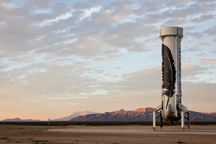The Next Space Race
Opening Space to All
Bretton Alexander
Director, Business Development & Strategy
Blue Origin
About the Lecture

What is “commercial” human spaceflight? Why have only a relatively small number of highly trained government specialists flown into space 55 years after Yuri Gagarin’s first flight? This lecture will discuss the relatively recent development of commercial human spaceflight, with a focus on reusable space transportation systems designed to greatly decrease the cost and increase the safety of travel to and from low Earth orbit (LEO), opening space to thousands of ordinary people and entrepreneurs for the first time since the dawn of the space age. The lecture will focus particularly on the advent of truly reusable rockets, the new engines that power them, and the current capabilities and strategies of Blue Origin, Virgin Galactic, SpaceX, and NASA. Blue Origin’s New Shepard and New Glenn space transportation systems and the BE-3 and BE-4 liquid rocket engines that power them will be discussed in some detail. These systems will be compared and contrasted with other past and current approaches, including the Space Launch System currently under development by NASA. Finally, the lecture will reach beyond the technical details of launch systems and rocket engines to discuss how the development of safe, affordable access to space for people and cargo will open up vast resources for the benefit of humanity in myriad ways we cannot yet even begin to envision.
About the Speaker

Bretton Alexander serves as Director of Business Development and Strategy at Blue Origin. Previously, he served on NASA’s Advisory Council as Chair of the Commercial Space Committee, as a member of Commercial Space Transportation Advisory Committee, as President of the Commercial Spaceflight Federation, and as Executive Director for Space at the X-Prize Foundation, where he led the Google Lunar X Prize competition. He also was Vice President for Corporate and External Affairs at t/Space and served as Senior Policy Analyst for Space in the White House Office of Science and Technology Policy (OSTP). While at OSTP, Brett worked to develop the “Vision for Space Exploration” and he was deeply involved in the response to the loss of the Space Shuttle Columbia. Among other awards, Brett is a recipient of the NASA Exceptional Public Service Medal. Brett earned a BS and an MS in Aerospace Engineering at the University of Virginia.
Minutes
President Larry Millstein called the 2,374th meeting of the Society to order on Friday, 24 February 2017 at 8:00 pm in the Powell Auditorium of the Cosmos Club in Washington, DC. He announced the order of business and introduced new members. He presented an award to Former President Bill Maisch on his retirement from the General Committee after many decades of service. Membership Chair James Heelan read the minutes of the previous meeting, and they were approved without modification. President Millstein presented a summary of the 36th meeting of the Society, held in 1872, and then introduced the speaker for the evening, Bretton Alexander, Director of Business Development and Strategy for Blue Origin and his lecture on “The Next Space Race: Opening Space to All.”
Mr. Alexander began by discussing the First Space Race, between the United States and the Soviet Union to get to the moon, and the "absolutely blistering pace of technological development” it spurred, not seen before or since. People then expected space travel to be commonplace in the near future, he said. But now, 55 years since then, only 549 people have made it to orbit. He attributed the deceleration to the government-driven nature of space flight, high costs and a failure to develop reusable hardware.
The next Space Race, he said, is about making space safe, affordable, reliable, and accessible to all of us. It will be driven by individuals and the companies they found, like Blue Origin, SpaceX, Virgin Galactic, and Vulcan Group. Blue Origin, he said, founded and funded by billionaire Jeff Bezos, is focused on making it possible for millions of people to live in space, not on short term and monetary return on investment. The safest airplane you fly on is the one you just got off of: you know it works. For Blue Origin the key to winning the space race is to have the same reusability for spacecraft.
Blue Origin’s first objective has been the development of New Shepherd, a rocket with a six-person capacity that travels about 100 km above the Earth, the internationally recognized boundary of space. This project has culminated in the same New Shepard engines and vehicle reaching sub-orbital flight five times in a row.
Mr. Alexander described the technology developed for New Shepherd that allows it to take off and land vertically. He called it the first rocket designed to fly in both directions, with movable rocket fins at its base and a ring fin at its top, keeping it stably oriented even in 130 mile winds at high altitude. He also noted that its BE3 engine can throttle down 20%, much lower than other engines and can gimbal close to ground for smooth landings. The New Shepherd crew capsule is separate from the launcher and has an escape system with 70,000 lbs. of thrust that has been successfully tested. Blue Origin plans to fly people into space commercially, once testing is done, price to be determined. Virgin Galactic has sold 700 advance tickets at $250,000 apiece for flights to sub-orbital flight, he noted. While this in encouraging, he said, the market for sub-orbital flight is unknown.
The next step for Blue Origin is orbital flight, he said, and the development of the New Glenn rocket powered by BE-4 engines. New Glenn will be reusable and designed to fly people and commercial payloads. It will be large, almost as large as the Apollo Saturn V. Nevertheless, New Glenn will be the smallest orbital rocket Blue Origin intends to build: cost-effectiveness and efficiency increase with size.
Mr. Alexander then discussed the suborbital work of Virgin Galactic, funded by Richard Branson. It's first vehicle, the reusable Spaceship One, made two suborbital flights in 2004 and won the X Prize. Progress has been slow since then, he noted, and Virgin Galactic has not yet taken passengers into space.
He also discussed developments at Space X, founded by Elon Musk. SpaceX, he noted, developed the Falcon 9 and competed numerous commercial satellite and space station resupply missions. Several vehicles have been landed; but, none has been reused as yet. NASA pays $75 million per astronaut to Russia for transportation to and from the International Space Station. Commercial competition will provide the same service for less, in the near future. Space X has a contract with NASA to take astronauts to the space station by the end of the decade. Space X's goal is the development of much larger launch vehicles to take people to Mars and to begin a permanent manned presence there.
Mr. Alexander reiterated that engine technology is the key to less expensive access to space and is crucial to vertical landing, reusable vehicles. Blue Origin is developing a new engine capable of providing 70,000 horsepower using liquefied natural gas (LNG), a kind of engine that has never been done before. Liquefied natural gas, he noted, is more efficient (on a mass basis) than other rocket fuel, is cleaner, is less expansive and is available as a “side-benefit” of fracking. Blue Original plans to use seven of these new engines to take new New Glenn to orbit.
Mr. Alexander ended by pointing out that commercial space flight is almost uniquely American, and will advance the United States far beyond other countries as the leader in space travel.
President Millstein then invited questions from the audience.
One questioner asked what comes next for Blue Origin, after orbital flight. Mr. Alexander responded that the next vehicle, called New Armstrong, will be a “very, very big rocket" but he would not provide details.
Another questioner asked why Blue Origin is focused on rockets as opposed to airplane-like vehicles. Mr. Alexander explained that airplane-like vehicles do not scale well, whereas rockets do, and scale up is crucial to making space flight truly affordable.
After the question and answer period, President Millstein thanked the speaker, made the usual housekeeping announcements, and invited guests to join the Society. At 9:58 p.m., President Millstein adjourned the 2374th meeting of the Society to the social hour.
Attendance: 135
The weather: Clear
The temperature: 22°C
Respectfully submitted,
James Heelan
Membership Chair